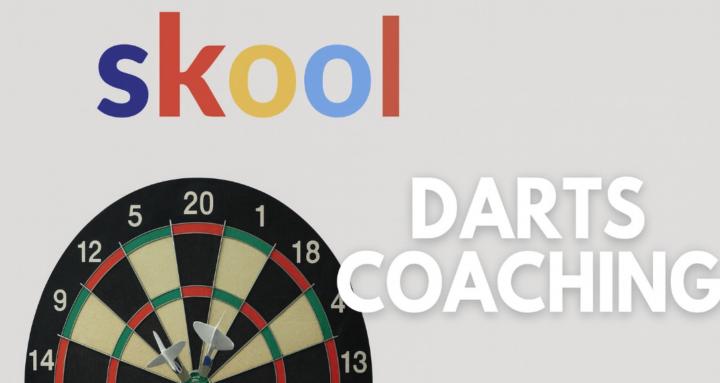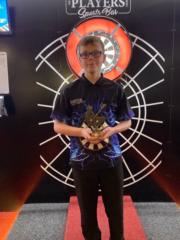
Write something
Why Darts Players Have Nicknames – And Why Choosing the Right One Matters
Walk into any darts venue, and you’ll quickly notice something unique about our sport: every player seems to have a nickname. From The Power (Phil Taylor) to The Iceman (Gerwyn Price), nicknames have become as much a part of darts as the oche itself. But this isn’t just for show. A nickname can be a powerful tool for confidence, identity, and performance — especially when used as an alter ego. Why Nicknames Matter in Darts 1. Identity & Recognition - A nickname gives you a brand. The crowd remembers Snakebite or The Machine long after a tournament. A strong nickname sticks. 2. Alter Ego Protection - Sometimes your real self doesn’t want the pressure. Stepping onto the oche as your alter ego means your “ego” isn’t on the line — the character is. This allows you to play freer, looser, and with more confidence. 3. Energy & Presence - A nickname carries energy. Rapid Ricky Evans plays fast, Big John Henderson plays big. The name sets the tone before the first dart is even thrown. 4. Psychological Edge - Your opponent feels it too. If they’re facing The Warrior, The Asp, or Mighty Mike, they already know what kind of fight they’re in. Types of Nicknames There’s no one-size-fits-all. Nicknames tend to fall into categories — each with its own power. 1. Power Nicknames – Strength & Dominance - Example: The Power (Phil Taylor) – unbeatable aura. - Example: The Iceman (Gerwyn Price) – cold under pressure. - Why they work: They create fear and respect. They project dominance. 2. Speed & Style Nicknames – Identity in Play - Example: Rapid Ricky Evans – reflects his lightning pace. - Example: Cool Hand Luke Humphries – calm and stylish under fire. - Why they work: They connect to playing style and remind you of your strengths. 3. Animal Nicknames – Instinct & Ferocity - Example: The Ferret (Jonny Clayton) – small, sharp, surprising. - Example: The Cobra (Jelle Klaasen) – fast strike, danger. - Why they work: Animals bring natural instinct and fear factor. They’re primal, memorable, and give you a fighting identity.
1
0
🎯 The Brain Doesn’t Care What’s True… Only What You Repeat
In darts, your results often follow your repetitions, not reality. Your brain doesn’t care if it’s true that you “always miss doubles under pressure.” If you keep repeating it, your mind will lock it in as fact — and it becomes your default script on the oche. The same works the other way. If you repeat “I’m calm and composed when I step up to finish”, your brain wires that belief instead. 👉 Every phrase you repeat — out loud or silently — is a dart you’re throwing into your own mind. Examples: - ❌ “I always get nervous on stage.” → reinforced nerves. - ✅ “I settle in and throw smooth under lights.” → reinforced composure. That’s why we work on self-talk just as much as technique. The words you rehearse become the habits you live. 🎯 7-Day Repetition Drill 1. Choose your phrase – short, strong, positive.Example: “I throw smooth and confident.” 2. Write it down – on a sticky note by your dartboard or in your phone. 3. Repeat it daily – say it out loud 10 times before your first throw. 4. In match play – repeat it silently as you walk to the oche. 5. Even if you miss – repeat it again. You’re training your brain, not just your throw. Do this for 7 days. Notice how the belief begins to feel natural. 🔟 Power Phrases to Choose From Pick one (or adapt it): 1. I throw smooth and confident. 2. I finish calmly under pressure. 3. Every dart is a fresh start. 4. I focus on my target, nothing else. 5. I breathe, I settle, I release. 6. I am composed and in control on stage. 7. Doubles are my strength. 8. I play my game, not the opponent’s. 9. My rhythm is steady and strong. 10. I trust my throw every time. Your darts will follow your dialogue.Train your brain as deliberately as you train your throw.
Where are you playing this Weekend?
I know Gary is down at MODUS. Some guys are at Crieff and others at a Rangers v Celtic charity event, sorry greens v blues.
Peace is the Nature of the Mind
Especially at the Oche In darts, the mind can feel like your greatest weapon—or your worst enemy. When you're overthinking, tense, or chasing perfection, everything tightens. But when you’re calm, focused, and present, something else takes over. Flow. Precision. Confidence. That’s why the phrase “Peace is the nature of the mind” matters so much in darts. 🧠 Peace isn't something you force. It's what’s already there when you let go of the chaos—when the pressure, doubt, and distractions fade. Like a dart released cleanly, peace is effortless when you trust, not when you try harder. We often think we need to "psych ourselves up" to perform. But more often
1
0
: 🎯 Environmental Flow for Darts Players
In darts, just like in golf, there’s a rhythm — a flow — that makes everything feel effortless. But unlike practice at home, the environment on stage or in the pub is full of variables outside your control. The crowd shouts, music blares, opponents slow down or speed up, and sometimes your head fills with “noise” even when the room is silent. This is Environmental Flow — your ability to stay present and perform at your best despite the chaos around you. 🚧 Common Disruptions in Darts - Opponent’s pace (slow vs. quick throwers) - Crowd noise, heckling, or clapping mid-throw - Tight spaces or unusual stages - Match nerves or waiting between visits - Unexpected pauses (score checks, chalking delays) 🧘 How to Stay in Flow 1. Breathing Reset – Before stepping to the oche, use one deep breath in and slow release to ground yourself. 2. Pre-Throw Routine – Develop a simple, repeatable process (place feet, look at target, one deep breath, throw). Consistency beats chaos. 3. Internal Consistency – Decide who you are on the oche. Calm? Focused? Aggressive? Anchor that state regardless of what’s happening outside. 4. Acceptance – Noise, distractions, or opponent behaviour will come. Your power is in choosing your response. 🗝️ Key Takeaway Flow in darts isn’t about silence, perfect timing, or a friendly crowd. It’s about training yourself to perform in any environment.The players who can keep rhythm in the storm are the ones who rise when it matters most.
1
0
1-23 of 23

skool.com/darts-360-performance-academy-1933
Mindset and Performance Coaching for Darts Players
Powered by





